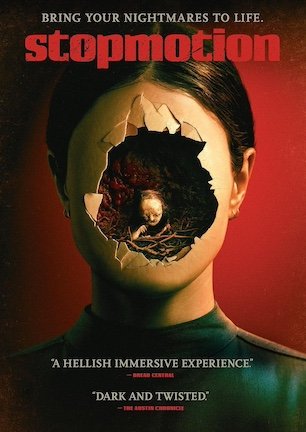Studio: IFC Films/Shudder
Director: Robert Morgan
Writer: Robert Morgan, Robin King
Producer: Alain de la Mata, Christopher Granier-Deferre
Stars: Aisling Franciosi, Tom York, Caoilinn Springall, Therica Wilson-Read, Stella Gonet
Review Score:
Summary:
While coming to grips with a creative drought as well as an identity crisis, a bizarre new project sends a frustrated animator into a spiral of madness.
Review:
A quick skim of pull quotes from published critics shows a fair amount of effusive acclaim for "Stopmotion," an experimental indie that follows a frustrated animator's journey into a nightmare of her own mind's making. Collider calls it "a one-of-a-kind, hand-crafted horror film with a great performance from Aisling Franciosi." The New York Times says, "director and animator Robert Morgan has crafted a narratively slender, visually sophisticated first feature." Paste Magazine raises its praise highest of all by claiming "Morgan's feature debut is as stunning, diabolical and boundary-pushing an emergence as any filmmaker could hope to achieve."
I chose those particular quotes to demonstrate how positive words still possess the ability to instill an unfavorable impression in those with a particular bias. For instance, if you're someone who stares desperately at a clock whenever a movie enters arthouse territory, you can read between the lines above and equate "narratively slender, visually sophisticated" with "barely a linear plot, but looks good" or translate "boundary-pushing (feature debut)" to "throws things at the wall and hopes an agreeable audience thinks those things stick."
I also chose those quotes because I wish I had the same appreciative experience with "Stopmotion" that those critics apparently had. To my taste, "Stopmotion" is a common character study that illustrates a struggling person's descent into interpretive madness and, although it is indeed well made, the movie doesn't do anything impressive enough to convince me the genre needs yet another one.
The first shot in "Stopmotion" features a blue-hued egg whose slow rotation reveals vein-like markings on its shell. Titles cut in with letters shaking violently, like when a misaligned filmstrip flutters through a projector. Aisling Franciosi appears onscreen as Ella, the stop-motion animator suffering an identity crisis throughout the film. Her face alternately lit red and green by strobing lights, Ella sways as though dazed while ravers dance behind her. Ella's expressions flash a range of odd faces as catchall "ominous music" then begins to swell.
I like that detailing of the film's first minute because whether that erratic assembly sounds like an aesthetic that's right up your alley or the kind of ambiguous sequencing that puts you to sleep, you already have a sound idea of where you'll stand with "Stopmotion." Some slow-burn dramas favor the slow. Others favor the burn. "Stopmotion" very much belongs in the former category.
As the "narratively slender" story goes, Ella starts out as subservient to her overbearing mother, an overused archetype that Stephen King essentially had the last word on in 1974. An acclaimed stop-motion artist herself, Suzanne sees Ella as inferior, and never misses an opportunity to coldly cut down her daughter with this opinion.
After a stroke hospitalizes Suzanne, Ella has a window to finally make her own film. The trouble is, coming up with imaginative ideas isn't her strong suit. So when a mysterious little girl who goes unnamed shows up with a suggestion to make a movie about a lost girl hiding from a sinister stalker, Ella seemingly meets her muse. However, Ella's life soon undergoes an upheaval as her movie's menace begins inexplicably making haunting appearances that could be driving Ella crazy.
With its cerebral focus, "Stopmotion" contains several interpretive elements, yet its themes aren't difficult to uncover. Ella's situation finds her experiencing writer's block, wrestling her personality away from her mentor's inescapable shadow, and being quite literally consumed by work. No matter if these messages are depicted as hallucinatory excursions into a dark forest or mirrored in frightening figures molded from mortician's wax, similar issues affect those in creative fields on a regular basis. That's why it's unexpected that "Stopmotion" couldn't connect with me personally, even when its central character should be an avatar for anyone’s feelings of imposter syndrome and directionless career choices.
I suspect the problem is "Stopmotion" takes too much out of The Abstract Artist's Playbook in terms of hoping it weaves a terrifying texture out of happenstance more than substance. "Stopmotion" is far more approachable as fiction than something like "Skinamarink's" (review here) impenetrable pile-up of unrelated imagery, so don't mistake that connotation to mean "Stopmotion" doesn't make sense. "Stopmotion" has a story, but it tells the tale with atmospheric elements that feel haphazard as opposed to planned. "Music" often sounds like a squeaky tricycle or a metal chair scraping across a hard floor. Ella's puppets emit vaguely unnerving vibes, yet they look almost as cute as they are creepy, not at all like true "nightmare fuel."
In simplest terms, I reiterate my wish that I saw the "one-of-a-kind" vision that writer/director Robert Morgan set out to create instead of a mostly uneventful effort formed from fractured ideas. Morgan's compelling artistry is unquestioned, but its effectiveness remains up for debate. Where one person saw something "stunning" and "diabolical," I only saw a slight spooker that turned out to be more of a snoozer.
Review Score: 45






In hindsight, maybe the more muted “28 Years Later” had to walk so the more meaningful “The Bone Temple” could run.